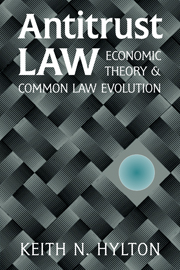Book contents
- Frontmatter
- Contents
- Preface
- 1 Economics
- 2 Law and Policy
- 3 Enforcement
- 4 Cartels
- 5 Development of Section 1 Doctrine
- 6 Rule of Reason and Per-Se Rule
- 7 Agreement
- 8 Facilitating Mechanisms
- 9 Boycotts
- 10 Monopolization
- 11 Power
- 12 Attempts
- 13 Vertical Restraints
- 14 Tying and Exclusive Dealing
- 15 Horizontal Mergers
- 16 Mergers, Vertical and Conglomerate
- 17 Antitrust and the State
- Index
11 - Power
Published online by Cambridge University Press: 12 November 2009
- Frontmatter
- Contents
- Preface
- 1 Economics
- 2 Law and Policy
- 3 Enforcement
- 4 Cartels
- 5 Development of Section 1 Doctrine
- 6 Rule of Reason and Per-Se Rule
- 7 Agreement
- 8 Facilitating Mechanisms
- 9 Boycotts
- 10 Monopolization
- 11 Power
- 12 Attempts
- 13 Vertical Restraints
- 14 Tying and Exclusive Dealing
- 15 Horizontal Mergers
- 16 Mergers, Vertical and Conglomerate
- 17 Antitrust and the State
- Index
Summary
What is monopoly power? The economic definition of monopoly is simple: sole producer. That is not a useful concept for antitrust law, because there are few sole producers in the American economy. Antitrust courts have defined monopoly power as the power to control price or to exclude competition. In this chapter, I will focus on the first part of this definition.
MEASURING MARKET POWER
There are three methods of measuring monopoly power.
(1) Market Share. The traditional method of measuring monopoly power, and the method commonly used in courts today, is to examine market share. This requires definition and identification of the relevant market. Given a definition of the relevant market, a firm's market share is equal to the firm's sales volume in the relevant market divided by total sales (by all firms) in that market.
Market share estimates can vary substantially depending on the definition of the relevant market. Areeda's text offers the following example: suppose there are ninety-nine producers of pleasure boats and one producer of canoes. If the relevant market is canoes, then the canoe producer has a 100 percent market share. If the relevant market is pleasure boats, then the canoe producer has a 1 percent market share.
It should come as no surprise that parties spend vast sums of money in litigation in efforts to get the Court to accept their definition of the relevant market.
- Type
- Chapter
- Information
- Antitrust LawEconomic Theory and Common Law Evolution, pp. 230 - 243Publisher: Cambridge University PressPrint publication year: 2003
- 1
- Cited by

